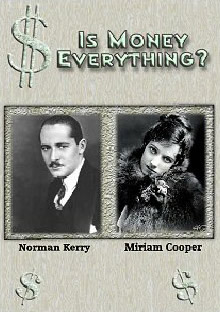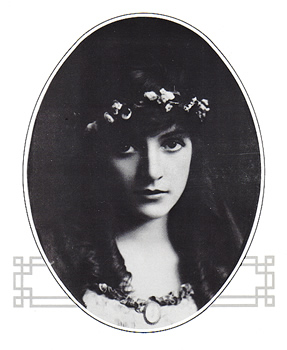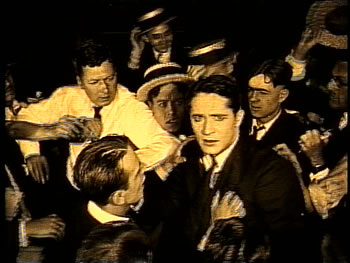
$$$ IS MONEY EVERYTHING? (1923) $$$
A review by David Gasten
December 28, 2010
Is Money Everything? (1923), starring Miriam Cooper, Norman Kerry, Martha Mansfield, Andrew Hicks, John Sylvester, William Bailey, and Lawrence Brooke. Directed by Glen Lyons. Theatrical release by Lee-Bradford Corporation. Silent, 61 minutes. Compiled score by Lou McMahon. DVD released by Grapevine video, May 2010.
(Click to buy Is Money Everything? from Grapevine Video. Click "Add to Cart", and when the e-shopping cart pops up, type "PNAS" into the Customer Code box to receive $2 off this title!)
 |
If you’ve seen D.W. Grififth’s Birth of a Nation (1914), you likely remember the girl with dark hair and the huge, dark doe eyes who played the older sister in the Southern family. You may also remember seeing her again as the sympathetic gangster moll in Intolerance (1916). The name of this adorable actress is Miriam Cooper. Although the roles she played in these two movies are very different from each other, her characterizations are universal in their portrayal of lovable, timeless, compassionate womanhood. Like many of D.W. Griffith’s actors and actresses, Miriam Cooper became a famous name in the silent era in her own right. Tragically, only a small handful of Miriam Cooper titles (five features and three short subjects) survive, which puts her with Theda Bara, Mary Miles Minter, and Annette Kellerman as a silent actress with a largely lost career.
With the release of Grapevine Video’s DVD edition of the independent 1923 feature Is Money Everything?, we have a very rare and precious opportunity to see Miriam again. Is Money Everything? postdates Birth of a Nation and Intolerance by nine and seven years respectively, so by this time the loveable traits that Miriam possessed in those movies are amplified and refined even further. Now apparently at the time of its release, Is Money Everything? was not considered to be one of her better films. According to some great original research in the Forget the Talkies blog, “Her business manager suggested a small independent film company that would only pay $650 a week…and film in Detroit for no real good reason. [Miriam] claims [filming Is Money Everything?] was a horror and she doesn't remember much of it.” But watching the movie without the benefit of comparing it with her other material from the time, it stands up quite well as an enjoyable melodramatic morality play with a strong storyline and strong acting performances.
Story Synopsis
 |
Awwww... Here's a portrait of the lovely Miriam Cooper from her autobiography Dark Lady of the Silents (1973). In Is Money Everything?, Miriam is a little more mature, but still just as gorgeous and ultra-feminine, and those huge dark eyes that you see here are incredibly sensitive and moist. |
John and Marion Brand (Norman Kerry and Miriam Cooper) live in small-town upstate New York. Marion’s father is a pastor of the local church, and John is initially studying to be a pastor as well, until an entrepreneur named Sam Slack successfully recruits John to join in a business partnership. Marion tries to convince John against it, but John enters the partnership anyway, and the two open a general store for the small community. Unfortunately, the initial success turns John into a greedy charlatan who uses dishonest methods to drive his competitors out of business and drive his employees like slaves. A society wife from New York City (Martha Mansfield) happens to be motoring through the country, and stops at the country store in time to see John beat up a neighborhood bully as well as some of his own workers who are threatening a strike. She falls for John on the spot. After John’s ruthless, self-centered behavior makes him a wealthy man, he starts eyeing the stock market, and moves to New York City to become a successful speculator. Meanwhile, Marion sits at home unhappy, even though she is surrounded by wealth. John decides to lay easy on a competitor that he is thrashing, hoping that the competitor can help them enter high society and thus help curb his wife’s loneliness. The competitor attempts to use this to his advantage by trying to have his wife get information from John about his methods. But the competitor’s wife just so happens to be the infatuated girl who fell for John on her country drive in the months previous. Her love is one-sided, but that doesn’t stop her from scheming ways to try to get John alone. John’s competitors finally do get the information that they need to crush him and send him high-tailing back to upstate New York, where John is later found behind the pulpit at church, telling the congregation that Money Isn’t Everything. But I’ll let you watch the movie for yourself to find out how that info got leaked.
Rare and Precious Performances
In this movie, we get to see amazingly rare and precious performances from not only Miriam Cooper, but also from an early Norman Kerry and another “lost career” actress, the lovely Martha Mansfield. Being able to see these performances is as precious as seeing Theda Bara as the “good bad girl” with a big mama’s heart but who can still vamp it up in The Unchastened Woman (1925), watching Jeanne Eagels disturbingly turn into a monster in her only surviving talkie The Letter (1929), and watching Lon Chaney Sr. amaze us as the “Man Of One Hundred Voices” and then wave us a heart-wrenching “See you in hell” goodbye in the talkie version of The Unholy Three (1930). We have no choice but to cherish these little drops of light from the movies’ infancy that are still with us, as we wonder what else we are missing and/or what might have been.
Martha Mansfield is best known for playing Dr. Jekyll’s fiancée in the John Barrymore version of Dr. Jekyll and Mr. Hyde (1920); to my knowledge her only other surviving movies are this one and a minor role in The Silent Command (1923), featuring Theda Bara’s Fox director J. Gordon Edwards (yet another lost career) and a young Bela Lugosi. In Is Money Everything?, Martha is supposed to work as a Delilah-type character and get information out of Kerry, but ends up falling in love with him instead, with little regard for passing on the needed information. In a 1997 Classic Images article on Mansfield, Eve Golden refers to her as a transitional actress between the Griffith Girls and the flappers, and that is very accurate. She is everything we think of when we imagine an early 1920’s sex goddess, with brunette hair, flashing, sparkly eyes, small kissable lips, and a cute yet slightly feisty personality. After all the work she does in trying to compromise Norman Kerry’s character’s marriage, we end up feeling like she got what she deserved when Kerry marches her out of his life, but we also end up feeling just a little bit sorry for her as well, and wishing that the situation could be a little different so that she could fall in love with him legitimately. So there’s a little bit of sympathetic “I’m not bad, I’m just drawn that way” in her character. Well done, Martha.
 |
A moustache-free Norman Kerry in a still frame from Is Money Everything? In this poignant scene, he is on the floor of the stock exchange, realizing that his days as a speculator and high finance shark are over. |
Norman Kerry we tend to think of with his wire mustache and this dapper, European-style gentleman demeanor as per The Phantom of the Opera (1925) and The Unknown (1928). Kerry was already playing these gentlemanly characters in The Merry-Go-Round and The Hunchback of Notre Dame, which were also released in 1923. But here, he is almost unrecognizable, not only because he is clean-shaven and therefore somewhat more boyish looking, but also because the character he portrays is very American (rather than European) in its nature. Kerry’s character covers a lot of ground as a small-time farmer, a loving husband, an unscrupulous entrepreneur, a rabble-rouser, a stock market shark, a social climber, and a preacher. This variety of characters is tied together by a manly, confident, and overall jovial and sympathetic base character. We know that he’s really a good man at heart but has been temporarily blinded by greed, and we have faith that he will return to the high road eventually. There are a lot of Norman Kerry movies that are still with us, but this one is particularly special because it’s such a different character for him.
And then there’s Miriam Cooper. Wow. Miriam’s role as the ever supportive wifey who guides hubby back onto the high road really makes this movie. She just blows her Birth of a Nation and Intolerance roles out of the water, as good as those were. Have you ever met a sensitive, feminine-to-the-core woman who has gigantic, moist, innocent eyes that well up with tears at the slightest provocation? If not, you have now—this is it and how. The femininity that this lady exudes is thick, heavy, brimming with personality and a wide variety of emotions, and undergirded with a gentle, paradoxical strength. Miriam seems like the most devoted wife in the world, and as a man watching the movie, the person that she seems to be really devoted to is you. Despite Martha Mansfield’s feisty coaxing, you know that Miriam’s unconditional love is what is really worth holding out for, and you so want with everything in you to be the best husband and provider in the world for her and cherish her delicate soul with everything that you have in you. It’s one time when you don’t mind someone wearing their heart on their sleeve, because in this case it’s natural and you know that you are there to protect it. If you still have some vive la différence in you, this movie is worth getting for Miriam’s incredibly endearing performance alone, and would be even if the movie were a complete dog.
As for the print itself, for the most part it’s quite crisp and has a lot of detail in it, although there is a boat scene that is overexposed and a scene where one of the Wall Street sharks tries to cuddle up to Miriam (only to get slapped) where the picture “splits” so that the top quarter is on the bottom of the picture. The music score is a compiled score by Lou McMahon, and is adequate and for the most part underscores the movie well. The timing of the music in the “greedy eyes” scene is off and the music choice is not as strong as it should be for that one scene, but that’s the only really noticeable soundtrack glitch. The print is tinted and toned throughout in sepia, green, bronze, and goldenrod, and there are numerous original illustrated titles that add an extra touch.
Is Money Everything? does a lot of things right. It works well within its limitations, and has a strong and easy-to-follow storyline with very few confusing elements. The movie features characters with depth and range, and it doesn’t fall for utilizing shallow, stereotypical portrayals—for example, Kerry is not at all a naïve country boy that gets taken advantage of, and the Wall Street sharks are sympathetically human and, though unscrupulous, not fully evil. The movie understands its audience and enforces the audience’s belief in the simple life, while also allowing them to imagine what a ritzier life might be like (a bit hypocritical in a way, but it works). And it centers around women without becoming a complete chick flick. And best of all, it has the beautiful performance of darling Miriam Cooper, in what may be one of the few opportunities we will have to see her in her late career. Definitely don’t make the mistake of overlooking this gem.

